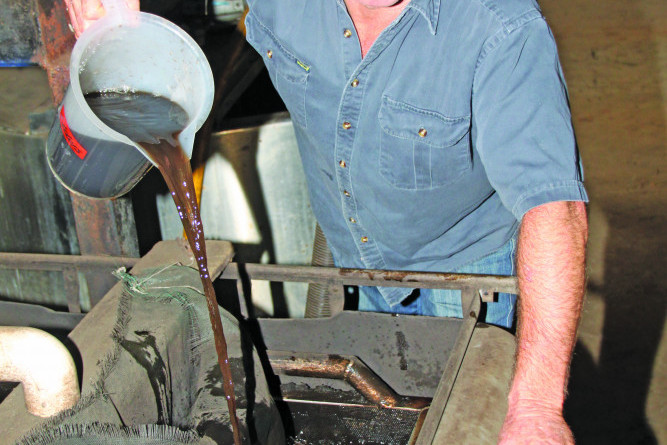On The Land
11 March, 2022
Worm juice liquid gold for farmers
IN an agricultural environment increasingly reliant on chemicals and antibiotics, Glenn Oliver has returned to the earth to develop a product created in the first instance by Mother Nature.

Operating on the credo “Healthy soil makes healthy plants and healthy food makes healthy consumers”, Glenn and his wife Uli Lenitschek have been trying to do their bit for the planet.
“We have produced around 70 per cent of our own food for our family for many years now and our children have always been very healthy. They have not suffered from the flus and viruses that are so common at school,” Mr Oliver said.
With a little help from a couple of million earthworms, Mr Oliver has also been producing Nutrigold Liquid Castings or “worm juice” – a concentrated, organic liquid extracted from the castings of worms fed on biodynamic cow manure, rainforest mulch, rock phosphate, seaweed, diatomaceous earth and lucerne.
After 15 years of development, his worm juice can now be sprayed pure on to pastures, tempered only with a combination of trace elements, or as part of a Biomix blend incorporating nitrogen, phosphorous and potassium, salt boron and molasses.
“The trouble with relying on urea as the mainstay of your pasture program is that too much of it causes the soil bacteria to go ballistic, consuming all the carbon and degrading the soil until it is barely functioning,” Mr Oliver said.
From that point, farmers have to add more and more fertiliser each year to achieve declining production rates coupled with increasing input costs.
Worm juice provides over 60 different nutrients and minerals, meeting most plant requirements. The enzyme in the worm's digestive system renders all the soil's nutrients and trace elements water soluble, and readily available for plant absorption.
As nature's soil cleanser and dead matter tidier, the worms' castings make the perfect fertiliser. While it has a modest nutritional profile in comparison to standard fertilisers, it is the only one with its nutrients totally available to the plant.
“A vigorous, healthy root system is the key to productive pasture and through photosynthesis, worm juice stimulates the production of sugars which are released into the roots,” Mr Oliver said .
“The sugars feed the microbes in the soil, enabling them to store organic carbon, unlock nutrients and protect roots from stress and disease. The large root mass then acts like a sponge, limiting compaction and sustaining plants longer through the dry periods.
“Once established, this symbiotic process has the power to turn red soil to chocolate as the organic matter increases. I have begun trialling the juice as a molasses additive. I believe it can aid digestion, improve gut health and reduce methane emissions in cattle.”
Agronomist with Tableland Agricultural Services, Zane Micola, has been introducing clients to worm juice for use on predominantly avocado, peanut and potato crops around the Tablelands.
“While the extremely high costs of crop inputs such as fertiliser and chemicals make it hard for farmers to digest another crop cost at the moment, our clients are warming to the Biomix and its uptake has been expanding,” he said.
“I have been seeing a good response from both foliar spray and fertigation. It is a good quality product that improves plant health including disease resistance, prolongs the release of fertiliser and boosts the plants' water holding capacity.
“All the mix's inputs are sourced locally on the Tablelands and I have seen how the health and vigour of treated plants have improved post-application. Its ability to improve the soil biology and microflora creating healthier plants makes it an ideal addition to cropping programs.”
Neighbour and long-time user of worm juice, Gillian "Cookie" Collins described it simply as “bloody good”. For the past decade, the Collins' have been finishing their droughtmaster steers brought in from “Spring Creek” Station, on their Lake Eacham block before selling them on to Morganbury Meats.
“Our cattle always do well here because the percentage of legume in the pasture has increased significantly. Our farm always looks better than most of the others in the dry time. It is able to hold the moisture in the soil longer so the grass stays greener longer,” Ms Collins said.
Mr Oliver's love affair with worms started back when he was a New South Wales schoolboy whose father's vegetable garden supplied the local district.
“A ‘hippy from the hills’ brought down a bucket of worms, saying ‘try these in your patch’,” Mr Oliver said.
He then went off to study aquaculture at university and returned to fi nd an already productive garden, transformed.
“From then on, I kept thinking about worms and what they could do. I dabbled in the process a couple of times over the years, interested to explore the possibilities,” Mr Oliver said.
“I built concrete bays beside the manure pit at my parents-in-laws' Millaa Millaa dairy farm many years ago, shovelling the manure straight out of the pit and started production, marvelling at the worms’ ability to deodorise the manure and convert it to humus in a week.
“We used it on the farm for awhile but it wasn't until we bought our block near Lake Eacham, stocked it with cattle and planted 600 organic lime trees, that I began the production of worm juice in earnest,” he added.



